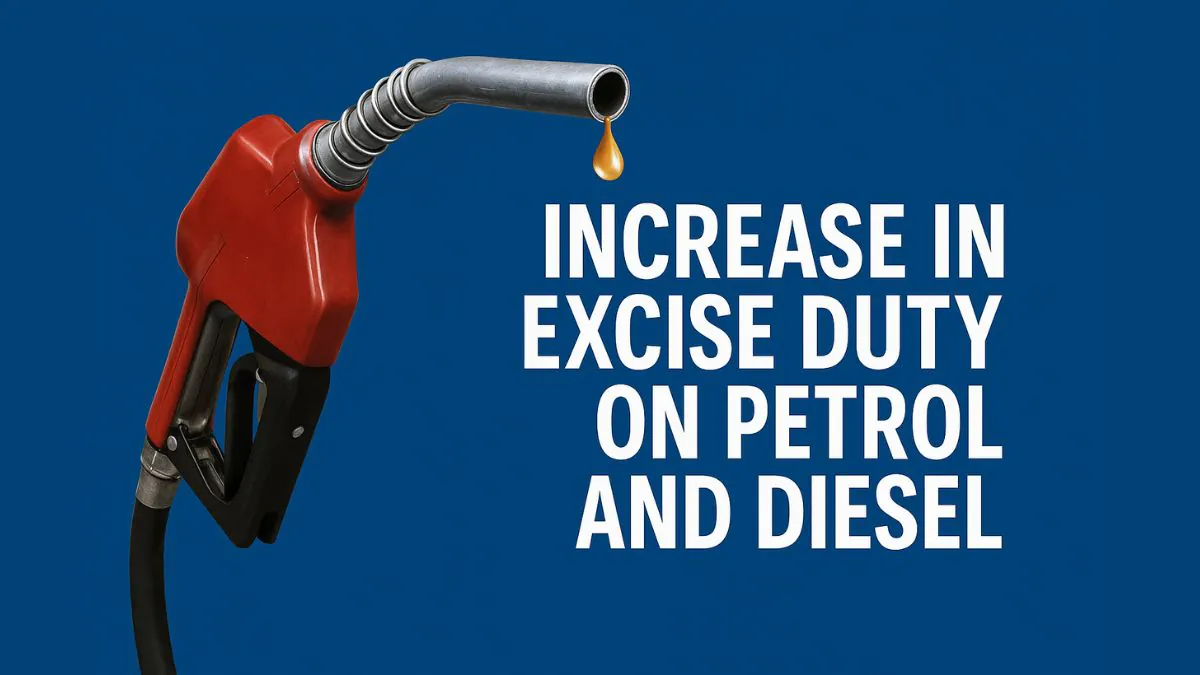Increase in Excise Duty on Petrol and Diesel

Table of Contents
ToggleShare this article ↷
On April 7, 2025, the Indian government dropped a small bomb-well, not really a bomb, but a Rs 2 per litre hike in the excise duty on petrol and diesel. Before you start panicking about your wallet taking a hit, here’s the good news: this increase won’t burn a hole in your pocket.
The oil marketing companies (OMCs) like HPCL, IOCL, and BPCL have decided to play the hero and absorb the extra cost. So, your fuel pump visits won’t feel any different-at least for now. Let’s break this down in simple desi style and see what it means for us common folks.
Read also: Rupee vs Dollar: Why Is the Indian Currency Gaining Strength?
What’s This Excise Duty on Petrol and Diesel All About?
For the uninitiated, excise duty on petrol and diesel is a tax the government slaps on fuel when it’s made. It’s like a hidden charge that gets added before the petrol or diesel even reaches your local pump.
This time, the duty has gone up from Rs 11 to Rs 13 per litre for petrol and Rs 8 to Rs 10 per litre for diesel, effective from April 8, 2025. Sounds like a lot, right? But chill, bhai, the government isn’t passing this on to us. The OMCs are taking the hit so that retail prices stay steady.
Why the hike? The government says it’s to boost revenue-think roads, bridges, and maybe some extra cash for schemes. With global oil prices dropping, they saw a chance to sneak in this increase without us feeling the pinch.
How Does This Affect Your Personal Finance?
Now, let’s talk about your personal finance. Since the retail prices aren’t budging, your monthly fuel budget stays safe-for now. Whether you’re zipping around on your bike or taking the family car for a weekend drive, you won’t need to shell out extra rupees at the pump. But here’s the catch: if global oil prices keep falling, we might’ve seen a price cut.
Instead, the government’s pocketing the difference via this excise duty on petrol and diesel. So, no savings, but no losses either. It’s like a draw in a cricket match-nobody wins, nobody loses!
For more details on how fuel prices work, check out the Petroleum Planning & Analysis Cell-it’s the official government site with all the juicy stats.
Why Should You Care?
Even if your fuel bill isn’t changing, this move affects the bigger picture. The extra money from the excise duty on petrol and diesel goes into the government’s kitty. Ideally, it’s used for stuff like better roads or healthcare-things we all benefit from.
But if you’re a skeptic like me, you might wonder if it’ll just vanish into some babu’s paperwork. Either way, it’s worth keeping an eye on how this cash gets spent. The Ministry of Finance often shares updates on such things-give it a peek sometime.
Key Takeaways
- The excise duty on petrol and diesel is up by Rs 2 per litre from April 8, 2025.
- No change in pump prices-OMCs are covering the cost.
- Your personal finance stays untouched, but no price cuts either.
- Government gets more funds, hopefully for our benefit.
Disclaimer
Well Returns is not a financial adviser. The content provided here is for informational purposes only and is intended to offer a brief overview and general knowledge. It is not a substitute for professional financial advice. Please consult a qualified financial adviser before making any financial decisions or investments.






